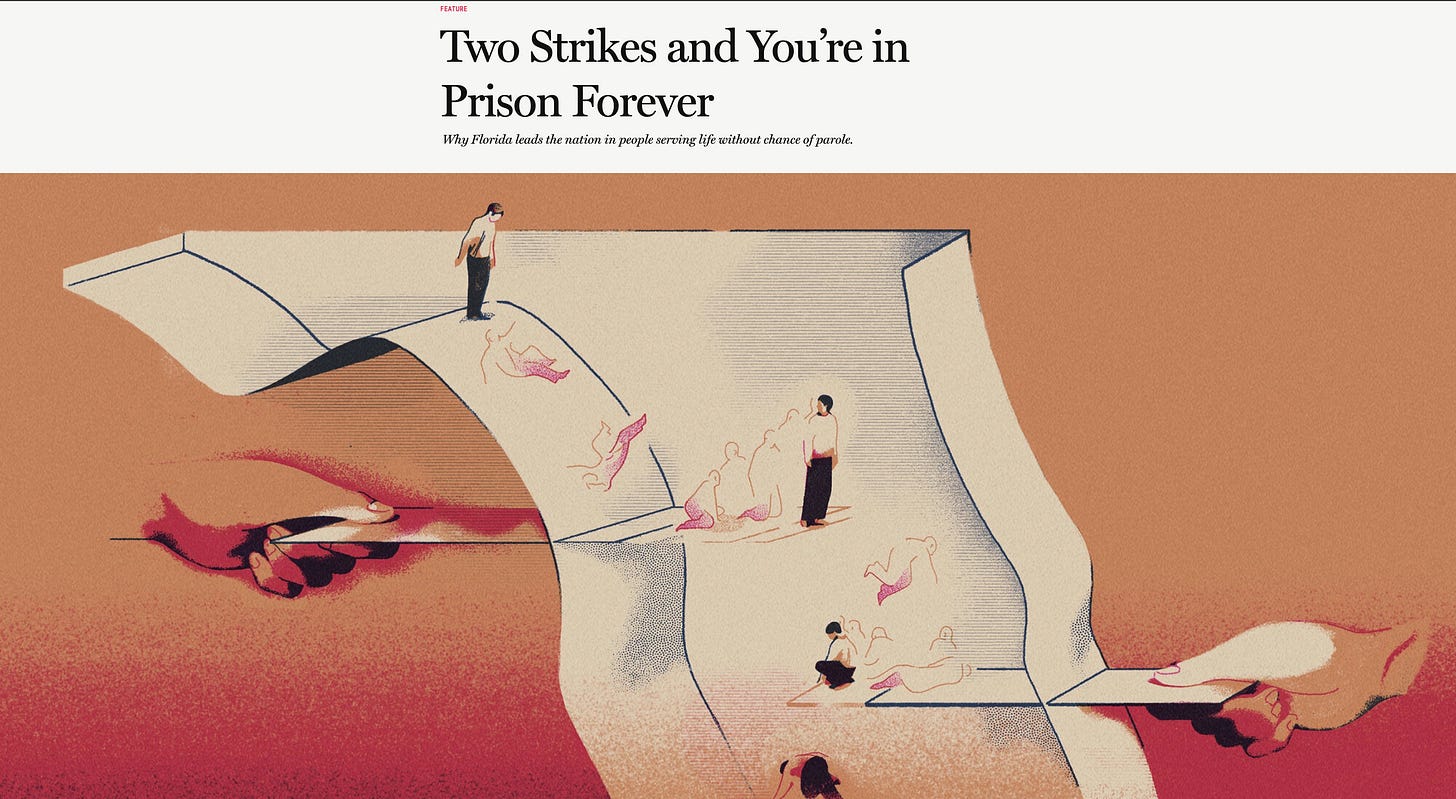the cost of strikes: how just two can lead to a life sentence
The Florida Department of Corrections spent over $300 million in the last fiscal year to house and care for inmates serving life sentences, your Friday long read from The Marshall Project
We go to The Marshall Project for this week's long read by Cary Aspinwall, Weihua Li, and Dan Sullivan. Read the whole story, “Two Strikes and You’re in Prison Forever.” We include key excerpts below to convince you it’s worth your time!
Two-strikes and you’re out
On a hot June afternoon in 2011, 69-year-old Eunice Hopkins rolled down the windows of her silver BMW, waiting for the air conditioning to kick in before she left a supermarket parking lot.
A tall, disheveled man in a straw hat walked up to her car window, grabbed her arm and demanded the keys, she told police in this Orlando suburb. She screamed and pulled out of the parking space. The man ran into a shopping mall across the street, where officers arrested him.
Mark Jones, a 37-year-old former West Point cadet, suffered from post-traumatic stress disorder and alcoholism, according to court records. He had been arrested before for low-level crimes and served a year in prison after stealing a $400 tool set from a Home Depot.
For the unsuccessful carjacking, however, he was sentenced to life without parole. That means he will never get out of prison, no matter how sober and industrious he has become in his 10 years behind bars.
The number of people serving life-without-parole sentences has soared across the country in the last two decades, rising to 56,000, according to The Sentencing Project, an advocacy group. Some people received these penalties as an alternative to capital punishment, which has fallen out of favor with many prosecutors and the public. The number of death sentences dwindled to 18 last year, and only 2,500 people are now on death row, down from almost 3,600 two decades ago.
But there’s another reason for the increase: A handful of states have embraced life-without-parole sentences to punish “repeat offenders” — even if their crimes didn’t cause physical injury, an investigation by The Marshall Project and The Tampa Bay Times found.
Underscored
Today, Florida has more than 13,600 people serving life without parole, far more than any other state and almost a quarter of the total nationwide. Though this sentence is widely seen as an alternative to the death penalty, which is used in murder cases, 44% of the people serving it in Florida were not convicted of that crime, according to our analysis of state data.
Part of the reason Florida’s numbers are so high is that it went further than any other state in 1997 by passing an unusual “two strikes” law known as the Prison Releasee Reoffender Act. The law directs prosecutors to seek the maximum sentence for someone who commits a felony within three years of leaving prison, which often means a lifetime behind bars. The law also takes sentencing discretion away from judges.
About 2,100 of the state’s permanent lifers, or about 15%, are in prison because of the law, our investigation found. The crimes that netted life without parole included robbing a church of a laptop, holding up motel clerks for small amounts of cash and stealing a television while waving a knife.
Bottom line
“This is an incredibly punitive law that is totally arbitrary,” said Jeff Brandes, a Republican who represents St. Petersburg in the Florida Senate and is trying to repeal the two-strikes law, so far without much support from his colleagues. He said Florida wastes too much taxpayer money locking people up forever on burglary, robbery and theft.
“A sentence that is too long is just as unjust as a sentence that is too short,” he said.
Prosecutors in Florida have sole discretion over when to seek the two-strikes sentence. And they almost always seek enhanced sentences, according to state data. Prosecutors asked for increased prison time in about 90% of the eligible cases, or more than 80,000 times since 2010. In the district that covers Tampa in Hillsborough County, prosecutors only pursued sentence enhancements on half of the eligible cases. In more than 50% of the districts, including St. Petersburg, prosecutors sought enhancements 100% of the time.
Some prosecutors said those numbers, which are reported to the state by their offices, don't reflect the outcomes of all cases, including plea deals.
"I can tell you with 100% confidence that we don't seek PRR 100% of the time," said Bruce Bartlett, the state attorney for the St. Petersburg district. "Quite frankly, I wish they would bring parole back."
Read the whole article here.
Resources: State policy changes. News. Bureau of Prisons updates. State court changes. Prison holistic self care and protection. Jailhouse Lawyers Handbook.
We want to hear from you about how COVID-19 is impacting you and the people connected to you. What is not being talked about? What story do you have that needs to be heard? Who do you want answers or explanations from? Please reach out to tips@thedes1790.com.




